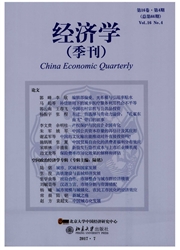
欢迎您!东篱公司
退出

 中文摘要:
中文摘要:
本文利用现代契约经济学基本理论,对同一技术条件下、由技术使用者替代性投入行为而产生的道德风险问题的价格契约治理机制进行了分析。分析结果表明,技术所有者总可以设计一种分离价格契约治理道德风险问题,其中,对自己偏好的高成本投入行为采用纯固定费用,而对低成本投入行为采用“固定费用+提成费”。本文进一步认为,价格契约中提成费比率对成本效率较高的投入行为所造成的扭曲程度,要大干成本效率较低的投入行为。
 英文摘要:
英文摘要:
Making use of contract theory, this paper analyzes several price contracts for the moral hazard problem in technological licensing. Moral hazard is a result of the substituting behavior of the licensee. We find that that the licensor can design two separate contracts to deal with the problem. A pure fixed-fee contract can be used for high-cost behavior and a linear price contract including both a royalty and a fixed fee can be used for low-cost behavior.
 同期刊论文项目
同期刊论文项目
 同项目期刊论文
同项目期刊论文
 期刊信息
期刊信息
